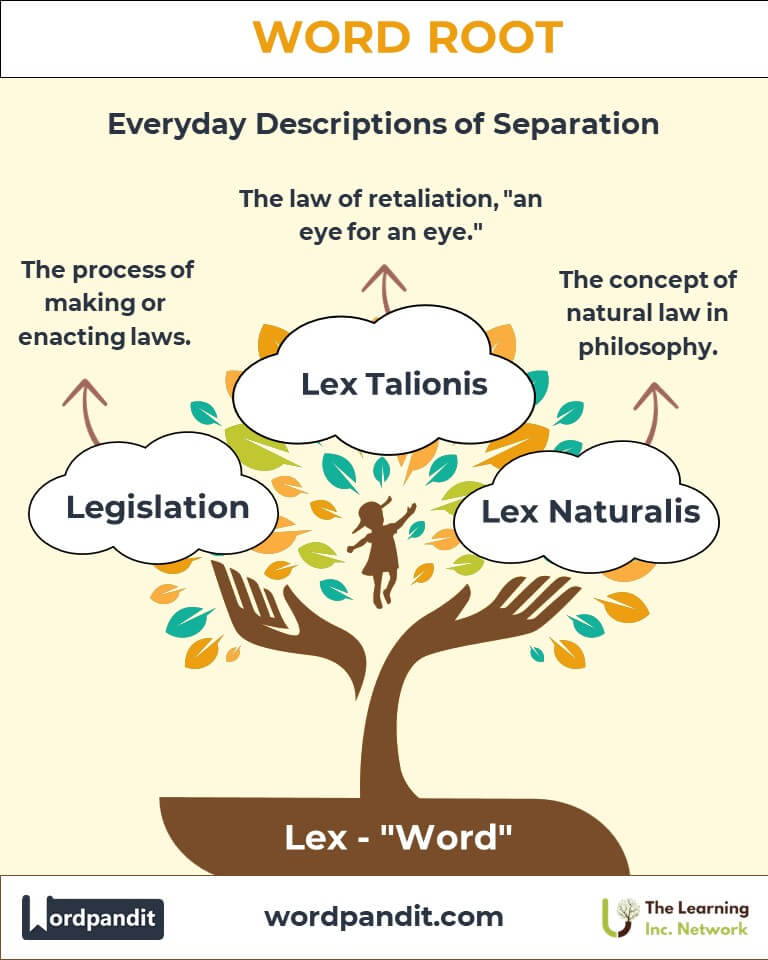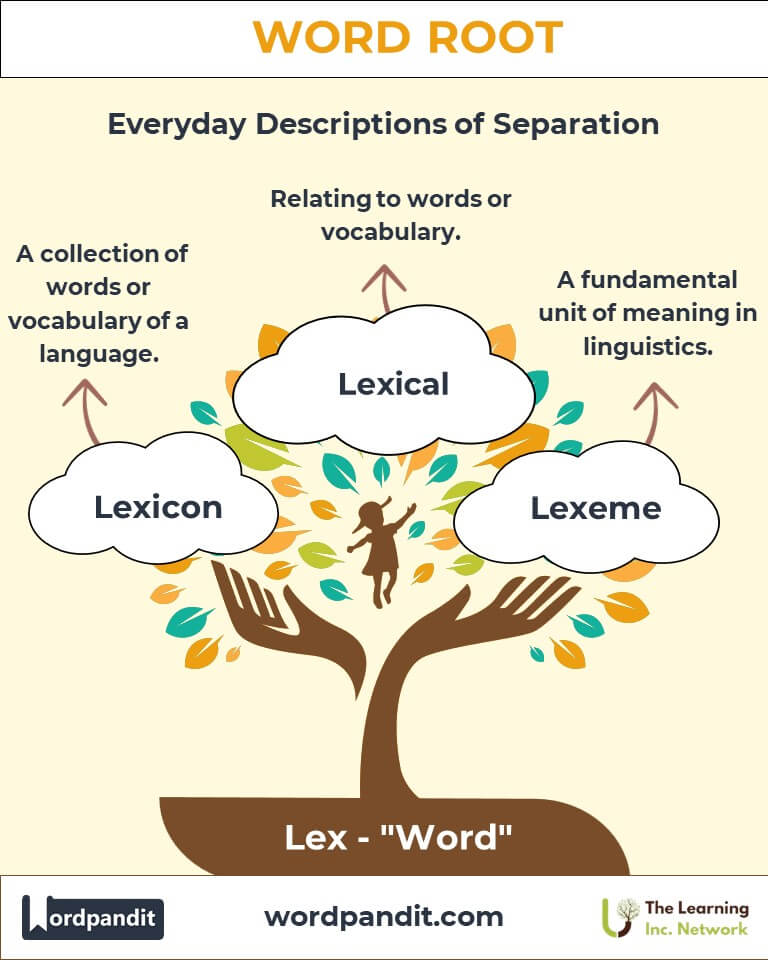Lex: The Root of Words and Laws in Language
Discover the power and influence of the root "Lex," originating from Latin, meaning "word" or "law." From linguistic concepts like lexicon to legal principles enshrined in lex legis, this root encapsulates the foundational role of words and laws in human civilization.

Table of Contents
- Introduction: The Essence of Lex
- Etymology and Historical Journey
- Mnemonic: Unlocking the Power of Lex
- Common Lex-Related Terms
- Lex Through Time
- Lex in Specialized Fields
- Illustrative Story: Lex in Action
- Cultural Significance of the Lex Root
- The Lex Family Tree
- FAQs About the Lex Word Root
- Test Your Knowledge: Lex Word Root Quiz
- Conclusion: The Living Legacy of Lex
1. Introduction: The Essence of Lex
What governs the words we speak and the laws we abide by? The root Lex (pronounced "leks") captures the essence of both "word" and "law," drawing a linguistic and legal connection that shapes our communication and societal frameworks. Derived from Latin, this root is the foundation of terms used in dictionaries, linguistic studies, and legal systems worldwide. Whether in a lexicon of words or the lex legis (laws of the land), Lex embodies the power of structure and meaning.

2. Etymology and Historical Journey
The root "Lex" stems from the Latin noun lex (law) and the Greek root lexis (speech or word). In ancient Rome, lex represented formalized laws passed by legislative assemblies, while in Greek traditions, lexis symbolized structured speech or diction.
During the Middle Ages, lex expanded into canonical and civil law, giving rise to phrases like lex talionis (the law of retaliation). In linguistics, Greek-inspired terms like lexicon became essential in describing word collections and dictionaries. Over centuries, this root has bridged communication and governance, influencing fields like law, linguistics, and philosophy.
3. Mnemonic: Unlocking the Power of Lex
Imagine a grand library with rows of legal tomes and dictionaries, labeled "Lex," where every word and law is neatly organized and accessible. The root Lex stands at the crossroads of language and justice.
Mnemonic Device: "Lex is the library of words and laws, organizing society and speech alike."
4. Common Lex-Related Terms
- Lexicon (LEK-suh-kon): A dictionary or the vocabulary of a language or field.
- Example: "Her lexicon of legal terms impressed her professors."
- Lexical (LEK-si-kuhl): Pertaining to words or vocabulary.
- Example: "The lexical analysis revealed patterns in word usage."
- Legislation (lej-uh-SLAY-shuhn): The process of making or enacting laws.
- Example: "New legislation aims to protect digital privacy."
- Lexigraphy (lek-SIG-ruh-fee): The art or practice of writing words.
- Example: "Ancient lexigraphy reveals insights into early writing systems."
- Lex Talionis (leks tal-ee-OH-nis): The law of retaliation or "an eye for an eye."
- Example: "Lex talionis formed the basis of justice in ancient Babylon."
5. Lex Through Time
- Lex Talionis: Initially codified in the Babylonian Code of Hammurabi (c. 1754 BCE), this principle influenced medieval and modern legal systems.
- Lexicon: The ancient Greek use of lexis expanded during the Renaissance to describe linguistic compilations, solidifying its role in modern dictionaries.
6. Lex in Specialized Fields
- Linguistics:
- Lexicography: The art of compiling dictionaries.
Application: Crucial in preserving and standardizing languages.
- Lexicography: The art of compiling dictionaries.
- Law:
- Lex Scripta (Written Law): Codified statutes and regulations.
Importance: Ensures consistency in governance.
- Lex Scripta (Written Law): Codified statutes and regulations.
- Philosophy:
- Lex Naturalis (Natural Law): A theory that certain rights are inherent by nature.
Relevance: Shapes ethical and legal thought.
- Lex Naturalis (Natural Law): A theory that certain rights are inherent by nature.
- Technology:
- Lexeme: The fundamental unit of meaning in computational linguistics.
Impact: Enhances natural language processing in AI systems.
- Lexeme: The fundamental unit of meaning in computational linguistics.
7. Illustrative Story: Lex in Action
In a bustling city, a linguist and a lawyer joined forces to create an innovative app combining a multilingual lexicon with a legal glossary. The linguist meticulously curated lexical entries, ensuring accurate translations. Meanwhile, the lawyer added context for legal terms across jurisdictions. Their collaboration empowered users to navigate international laws with ease, proving that Lex, whether in language or law, bridges gaps and fosters understanding.
8. Cultural Significance of the Lex Root
The root Lex reflects humanity’s need for structure and expression. Ancient societies like Rome used Lex to codify laws, while Greek thinkers emphasized its linguistic applications. Today, Lex continues to influence cultural dialogues about justice, governance, and the preservation of language.

9. The Lex Family Tree
- Logos (Greek: "word, reason"):
- Logic: Reasoning conducted according to principles.
- Apology: A formal defense or justification.
- Nomos (Greek: "law, custom"):
- Economy: Management of resources (household laws).
- Astronomy: Laws governing celestial bodies.
- Graph (Greek: "write"):
- Autograph: A person’s handwritten signature.
- Lexigraphy: Writing systems for vocabulary.

FAQs About the Lex Root
Q: What does the root "Lex" mean, and where does it originate from?
A: The root "Lex" means "word" or "law," originating from Latin and Greek. In Latin, lex referred specifically to codified laws, while in Greek, lexis denoted speech or words. This dual heritage allows "Lex" to bridge the realms of language and governance.
Q: How is a "Lexicon" different from a "Dictionary"?
A: A lexicon is a collection of words and phrases specific to a particular language, subject, or field. A dictionary, on the other hand, is a comprehensive reference tool that provides definitions, pronunciations, and usage examples for a language's words. While all dictionaries are lexicons, not all lexicons are dictionaries.
Q: What is "Lex Talionis," and how is it relevant today?
A: "Lex Talionis" means "the law of retaliation," famously expressed as "an eye for an eye." Historically, it appeared in ancient legal codes like Hammurabi’s and sought to ensure proportional justice. Modern legal systems often interpret this concept as restorative or compensatory justice rather than literal retaliation.
Q: What role does the concept of "Lex Naturalis" play in philosophy?
A: "Lex Naturalis," or natural law, is the idea that certain rights and moral values are inherent to human nature and discernible through reason. It has been foundational in shaping legal and ethical theories, influencing thinkers like Thomas Aquinas and John Locke and modern human rights discourse.
Q: What is the importance of "Lexemes" in linguistics?
A: A lexeme is the fundamental unit of meaning in a language. For example, "run," "running," and "ran" are forms of the same lexeme. Understanding lexemes is crucial in computational linguistics and natural language processing (NLP), where algorithms analyze and process language data.
Q: Why is "Lex Scripta" significant in legal systems?
A: "Lex Scripta" refers to written law, such as statutes and regulations, as opposed to unwritten customs or common law. Its significance lies in ensuring clarity, consistency, and accountability in governance, making laws accessible and enforceable.
Q: Can "Lex" be applied metaphorically outside its traditional domains?
A: Yes, terms like "lexicon of life" or "moral lex" metaphorically extend the root to signify systems of rules, vocabulary, or principles in various contexts, including philosophy, art, and personal ethics.
Test Your Knowledge: Lex Mastery Quiz
1. What does the root "Lex" signify?
2. Which term describes a collection of a language’s words?
3. What is the principle of "an eye for an eye"?
4. What field frequently uses "Lexeme"?
5. What does "Lex Naturalis" represent in philosophy?
12. Conclusion: The Living Legacy of Lex
The root Lex embodies the interplay between words and laws, the pillars of communication and civilization. From ancient legal systems to modern linguistic tools, Lex remains a testament to humanity's quest for order and meaning. As languages evolve and societies grow, Lex continues to shape our world, reminding us of the enduring power of words and laws.














